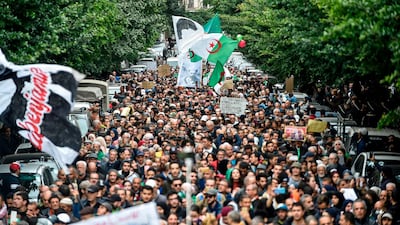Thousands of students, teachers and other protesters rallied in Algeria's capital on Tuesday against the newly elected president, rejecting his offer of talks.
Abdelmadjid Tebboune won 58.1 per cent of the vote in the December 12 election, official results showed, and on Friday said he was ready for talks to "build a new Algeria".
Protesters were opposed to the election, which they considered to be a ploy by the establishment to consolidate power after ailing president Abdelaziz Bouteflika resigned under popular pressure in April.
Chants of, "The election was fixed. It wasn't legitimate. The march will continue", filled the air in Algiers during the first weekly rally since the poll.
Security forces were in large presence but there were no confrontations with demonstrators.
"Tebboune will not govern us," protesters shouted, vowing to keep him from taking up residence at the presidential palace.
Mr Tebboune is set to be sworn in during a ceremony in Algiers on Thursday.
Protests have rocked Algeria since February, initially demanding Mr Bouteflika step down then pushing for the remnants of his regime to make way for new, independent institutions.
Turnout in the election was 39.9 per cent, the constitutional council said.
French President Emmanuel Macron on Tuesday congratulated Mr Tebboune on his victory, the Algerian preisdency told the official APS news agency.
Mr Macron called the president-elect to offer his "warm congratulations".
Mr Macron assured Mr Tebboune that "France stands by Algeria's side at this important moment in its history", the Elysee palace said on Tuesday.
It made no reference to "warm congratulations" but said Mr Macron offered "sincere wishes for success".
All five candidates in the election had links to Mr Bouteflika, who ruled for two decades despite a debilitating stroke in 2013.
Mr Tebboune is also considered close to army chief Ahmed Salah, who became politically prominent after Mr Bouteflika's departure.
Protesters, who have rallied every week since February 22 to demand far-reaching reforms, staged large demonstrations to mark the vote, with tens of thousands flooding the streets of Algiers.
The demonstrations were mainly peaceful, but a rights group said on Tuesday that several protesters sustained eye injuries when security troops used rubber bullets.
"The toll is still provisional but there are about 10 injured," Said Salhi, deputy head of the Algerian League for the Defence of Human Rights, said of events that took place on December 11 and 12 in various cities.
"Some are still hospitalised and some have lost their eyes for good."
Most of the incidents took place in areas where protesters clashed with security forces, such as the Berber-majority Kabylie region, where the strife disrupted voting.

